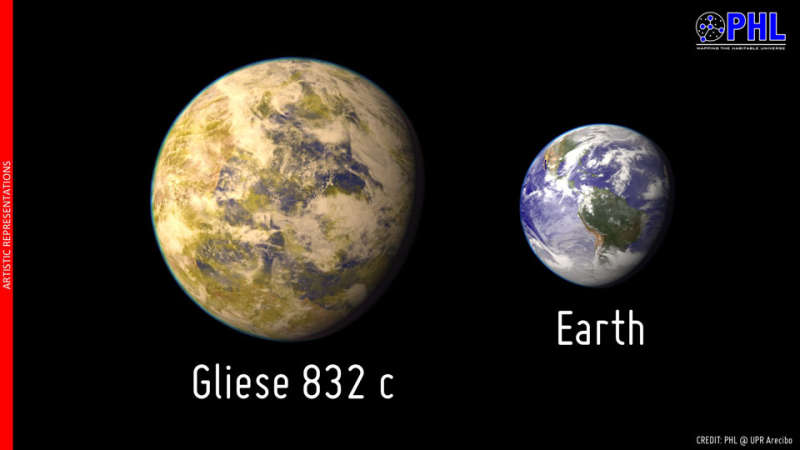 |
Астронет: Астрономическая картинка дня Глизе 832c: ближайшая к нам потенциально обитаемая экзопланета http://www.astronet.ru/db/msg/1316941/eng |
Credit & Copyright: The Planetary Habitability Laboratory @
UPR Arecibo;
Discovery: Robert A. Wittenmyer (UNSW Australia) et al.
Explanation:
This planet is only 16 light years away -- could it harbor life?
Recently discovered
exoplanet
Gliese 832c
has been found in a close orbit around a star that is less bright than our Sun.
An interesting coincidence, however, is that
Gliese 832c receives just about the
same average energy from its parent star as does the Earth.
Since the planet was
discovered only by a slight wobble in
its
parent star's motion, the
above illustration
is just an artistic guess of the planet's appearance --
much remains unknown about Gliese 832c's true mass, size, and atmosphere.
If Gliese 832c has an atmosphere like Earth, it may be a
super-Earth undergoing strong seasons but capable of
supporting life.
Alternatively, if Gliese 832c has a thick atmosphere like Venus, it may be a
super-Venus and so unlikely to support life as we know it.
The close 16-light year distance makes the Gliese 832 planetary system currently
the
nearest to Earth that could potentially support life.
The proximity of the
Gliese
832 system therefore lends itself to more detailed future examination and, in
the most spectacularly optimistic scenario, actual
communication --
were intelligent life found there.
Discovery: Robert A. Wittenmyer (UNSW Australia) et al.
Authors & editors:
Robert Nemiroff
(MTU) &
Jerry Bonnell
(USRA)
NASA Web Site Statements, Warnings,
and Disclaimers
NASA Official: Jay Norris.
Specific
rights apply.
A service of:
LHEA at
NASA /
GSFC
& Michigan Tech. U.
